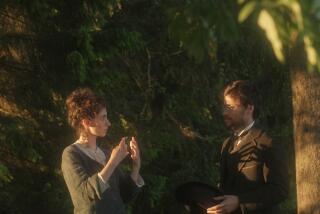Book Review : Alienation in Switzerland
- Share via
An Earthquake in My Family by J. F. Federspiel, translated by Eveline L. Kanes (E. P. Dutton: $17.95)
The best known Swiss writers tend to evoke the parable of the Gadarene swine. Several of the major demons of contemporary life--war, political instability, crushing poverty--have been driven out of this small and peculiar country. And J. D. Federspiel tells us about the monsters of disquiet that replaced them.
It is not the chilly but essentially civil disquiet practiced by some of our own writers. Madness, deformity and viciousness, presented bleakly or with a formidable but unredeeming humor, circulate in Swiss interiors so tightly sealed that no air gets in.
The best of Federspiel’s work leads us imperceptibly into his alienated world until suddenly, with the proverbial shock of recognition, we see it is our own.
Forced Satire
The earliest stories tend to be one-stroke sketches. In “Infirtaris,” a child’s imaginative isolation is suggested, rather patly, by a surreal profusion of black-clad aunts at her father’s funeral, and by the wind storm that suddenly strips and dismembers them. There is an acrid but forced satire on Swiss tidiness and money-grubbing in “The Monderau Chronicle.”
The last section of the book consists of sketches taken from “Paratuga Will Return.” Paratuga is a persistent, maladroit alter ego who continually reappears to pester the narrator with unwelcome schemes and interventions.
Paratuga constructs a waxwork museum for “potential personalities,” such as an illegitimate son of Berthold Brecht, or an unknown figure at Chappaquiddick. He gets the narrator to have lunch with Adolf Hitler’s daughter. Paratuga bursts into the narrator’s apartment late at night and asks him to turn the volume down on his dreams down because they are infiltrating his sleep.
Self-Indulgent
The Paratuga selections, though provocative, tend to become scatty and self-indulgent. The best things in “Earthquake” come in a middle section, written in the 1960s.
“The Man Who Brought Happiness,” set in a madhouse, works through delusions back to humanity. An inmate who thinks he is Vincent Van Gogh, sends paintings off to his daughter, who returns money and notes signed “Theo”--the painter’s brother and patron. But love goes both ways. When the daughter visits with her lover, a vain parasite, the father dismisses him with a line marvelously compounded of madness and vision. “You’re wasting your time,” he tells his daughter. “You can’t paint people like that.”
“The Promised Village” intercuts two narratives. In the first, a Jew, seeking to cross over into Switzerland with his daughter to escape the Nazis, is first stripped of his money by a French guide, and then threatened with expulsion by the Swiss border guards for being penniless. He kills himself, hoping that his child will be allowed to stay. The counterpoint to this is a legend about a hussar who seeks a fabled village where God has decided that all the inhabitants will either be saved together or damned together.
It is a clear reference to Switzerland’s careful isolation from the world’s tragedies. Federspiel’s point is grim, and he handles it beautifully. But his conclusion is even grimmer. Nobody remains in the village but an old woman, who is preparing to move out herself. Human solidarity is a burden that humanity can’t accommodate.
More to Read
Sign up for our Book Club newsletter
Get the latest news, events and more from the Los Angeles Times Book Club, and help us get L.A. reading and talking.
You may occasionally receive promotional content from the Los Angeles Times.








